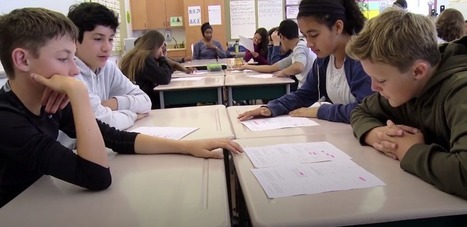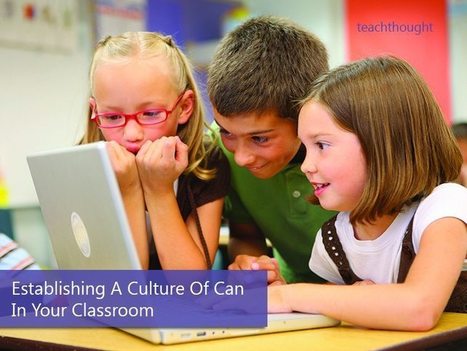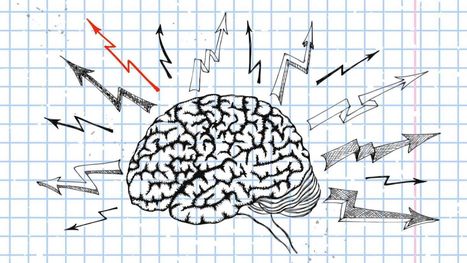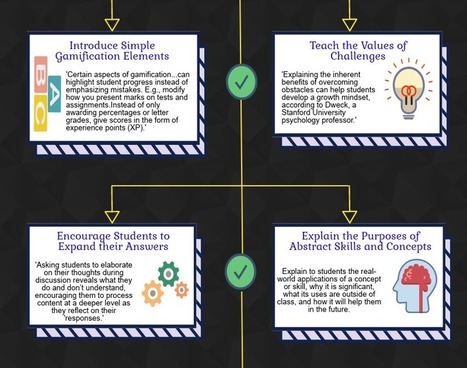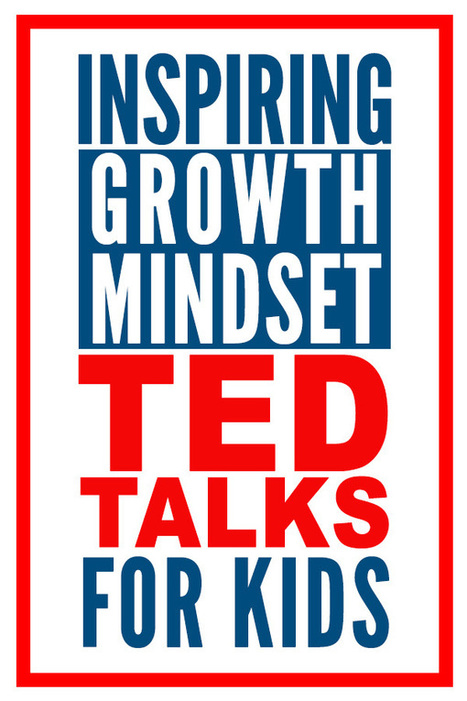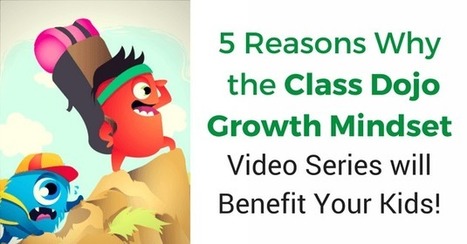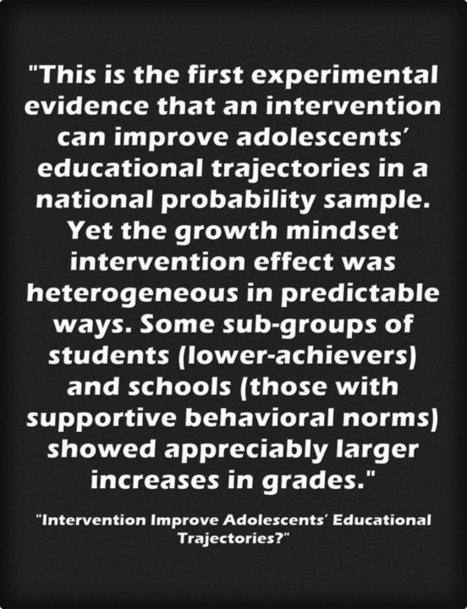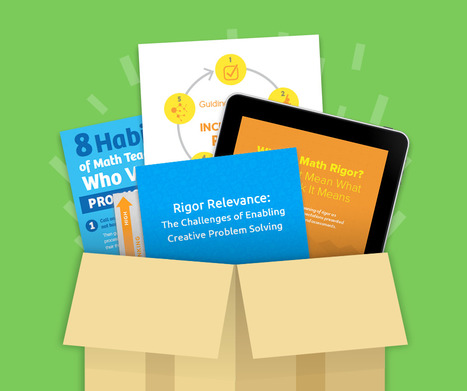 Your new post is loading...
 Your new post is loading...
Whether you are leaping into learning through college, university, or on your own time, there is one thing that is key. That is your mindset.
While these experiences in life will challenge you, it is your mindset that will determine whether you will succeed or fail. But also how much you grow.
In the end, our learning capabilities boil down to two mindsets that we must choose. Either a growth mindset or a fixed mindset. This growth mindset vs fixed mindset relationship is everything and is your key to success.
What we might not be aware of is the fact that we’ve already selected that mindset years ago. So to help out, I’ve put together differences between these two mindsets so that you can identify the problems and begin to grow yourself.
Via Jim Lerman

|
Scooped by
John Evans
|
Teachers know that students learn a tremendous amount from scrutinizing their mistakes, but getting them to take the time to stop and reflect is a challenge. Some teachers have stopped giving grades altogether to try to refocus class on learning instead of on grades. For others, that's too extreme. Leah Alcala, a seventh- and eighth-grade math teacher at King Middle School in Berkeley, California, developed a grading strategy that falls somewhere in the middle.
"What I was finding when I was handing back tests the old way, where I put a grade on it, was kids would look at their grade, decide whether they were good at math or not, and put the test away and never look at it again," Alcala says in a Teaching Channel video featuring her strategy.
Now when she returns tests, Alcala highlights mistakes and hands the tests back to students without a grade. She doesn't tell them what they did wrong; they have to figure that out.
"By not putting a grade on the test, I feel like what I'm allowing them to do is wrestle with the math they produced for me first and think of the grade second," Alcala said.

|
Scooped by
John Evans
|
A very popular buzz phrase on the education scene for a while now is growth mindset. We reference it repeatedly. We tweet about it and try to instill the value of failing in the learning process to students. Unfortunately, many of us are talking the talk, but not walking the walk when it comes to growth mindset in the learning process—especially in grading practices.

|
Scooped by
John Evans
|
Today, if you asked me about my most memorable learning failures, I will tell you I am glad they happened.
My errors have made me a better teacher and learner. I can now relate to students who have a difficult time understanding a concept. The failures themselves may not have been my strongest point, but what I learned from them was invaluable. Mistakes can be excellent learning opportunities.

|
Scooped by
John Evans
|
Amy is usually a happy and enthusiastic student in grade five who loves to dance, but she is struggling with a tough math assignment. She doesn’t think she is good at math because her classmates always get the answers faster than she does and sometimes she uses her fingers to help her count. Even though her mom tries to help her, Amy is convinced she just cannot do math. She decides not to do the assignment at all since she thinks she wouldn’t do well anyway.
As Amy goes about her day, her experiences at ballet class, the playground, and gym class have her thinking back to how she gave up on her math assignment. She starts to notice that hard-work, practice, and dedication lead to success, thanks to her friends and teachers. She soon comes to understand that learning math is no different than learning any other skill in life. With some extra encouragement from her math teacher, a little help from her mom, and a new attitude, Amy realizes that she can do math!…

|
Scooped by
John Evans
|
It’s easy to promote positive thinking and a can-do attitude in your classroom with these growth mindset posters. Each poster has an awesome message, reminding your students that mistakes are OK and hard work pays off. These posters are perfect for your school hallways or classroom.

|
Scooped by
John Evans
|
Like a lot of students, many elementary school teachers dread math class. But, according to a new study from researchers at Stanford Graduate School of Education, when teachers reexamine how they were taught math and their perceptions of their ability, student test scores and attitudes about math dramatically improve.

|
Scooped by
John Evans
|
Teens who read about the personal and intellectual struggles of scientists feel more motivated to learn science. That was the finding of a recent study out of Teachers College, Columbia University and the University of Washington.
Why? Many high school students view scientific ability as a fixed trait that is not responsive to effort. As the researchers wrote: “When students struggle in science classes, they may misperceive their struggle as an indication that they are not good at science and will never succeed.” When students learn about how even famous scientists struggled, they began to see that learning and growing from setbacks is part of a successful professional journey.
The researchers noted that published stories about scientists often focus on achievements but neglect mention challenges scientists faced. When Lisa Brennan, a middle school librarian at St. Christopher’s School in Virginia, read about this study in a recent MindShift article, her initial reaction was, “Wow, that parallels the research on the connection between fiction and empathy.” She reached out to her extensive Twitter followers to start gathering titles that cover both the achievements and the struggles of exemplary scientists that could be used with older students.

|
Scooped by
John Evans
|
If a learner is to develop a sense of can, he or she must learn it. While some students have more natural confidence or initiative than others, can is slightly different than confidence. Can is a mix of knowledge and self-efficacy that has been nurtured through experience — by consistently meeting both internally and externally created goals judged by standards that are also both internally and externally drawn.
So how does this happen? Where does it come from?

|
Scooped by
John Evans
|
Though there were a host of professional learning takeaways for me, one stood out as a real actionable item. Funny, this same theme came up at every conference I attended: Celebrating Failing.

|
Scooped by
John Evans
|
* How do we help young people prepare for lives full of novelty and complexity? After a two-year study of the influence of artificial intelligence(and exponential change more broadly) and a dozen community conversations, my team concluded there are four new learning priorities:
* Innovation mindset: a combination of growth mindset, maker mindset, and team mindset — in short, young people should learn to recognize the value of effort, initiative, and collaboration.
* Social-emotional learning: managing yourself and social interactions, making good decisions.
* Design thinking: attacking complex problems with empathy and iteration — using a repetitive process with the aim of approaching a desired goal, target, or result.
* Self-directed learning: staying curious, building deep subject expertise — repeatedly — and creating lifelong learning habits."
To foster growth mindsets in students, teachers can coach students to try different learning strategies that make the brain work smarter. Educator praise can be used to acknowledge specific strategies students have tried and can push students to reflect on themselves as learners. This process is more complex than it looks and ultimately should help lead students to become more independent thinkers.
Via Nik Peachey

|
Scooped by
John Evans
|
For today’s post we are sharing with you foster a growth mindset culture in your class. The visual is based on this post from Marcus Guido. We invite you to check it out and share with us your feedback.
|

|
Scooped by
John Evans
|
I admit it, TEDTalks might just be my all-time favourite, free learning resource! But what is not to love??! Here we have ten fantastic growth mindset videos exploring important mindset themes such as stamina, perseverance, overcoming obstacles, reaching for the impossible, overcoming procrastination, striving to achieve your goals, and more, available at just the touch of a button!
Teachers know that students learn a tremendous amount from scrutinizing their mistakes, but getting them to take the time to stop and reflect is a challenge. Some teachers have stopped giving grades altogether to try to refocus class on learning instead of on grades. For others, that's too extreme. Leah Alcala, a seventh- and eighth-grade math teacher at King Middle School in Berkeley, California, developed a grading strategy that falls somewhere in the middle.
"What I was finding when I was handing back tests the old way, where I put a grade on it, was kids would look at their grade, decide whether they were good at math or not, and put the test away and never look at it again," Alcala says in a Teaching Channel video featuring her strategy.
Now when she returns tests, Alcala highlights mistakes and hands the tests back to students without a grade. She doesn't tell them what they did wrong; they have to figure that out.
"By not putting a grade on the test, I feel like what I'm allowing them to do is wrestle with the math they produced for me first and think of the grade second," Alcala said.
A very popular buzz phrase on the education scene for a while now is growth mindset. We reference it repeatedly. We tweet about it and try to instill the value of failing in the learning process to students. Unfortunately, many of us are talking the talk, but not walking the walk when it comes to growth mindset in the learning process—especially in grading practices.

|
Scooped by
John Evans
|
New research funded by the National Science Foundation finds that online intervention taking less than 30 minutes significantly increases interest in computer science for both male and female undergraduate students.
"Our focus was on determining how and whether a 'growth mindset' intervention would affect student interest and performance in computer science," says Jeni Burnette, first author of a paper on the work and an associate professor of psychology at North Carolina State University, which conducted the study.
"We knew from previous work in other contexts that a growth mindset -- the belief that human attributes are malleable -- can have significant consequences for self-regulation and goal achievement," Burnette says.

|
Scooped by
John Evans
|
Find information about growth mindset, discover how learning mindsets can affect student performance, and explore strategies that support student confidence.

|
Scooped by
John Evans
|
"Over the summer, academics debated the impact of growth mindset, the belief that one’s intelligence can be developed with hard work and effort, and whether it can move the needle on academic performance. Even Stanford psychology professor Carol Dweck, who is often credited with the term, chimed in with additional research supporting the efficacy of mindset interventions.
An Education Week survey found that the vast majority of educators believe that a growth-oriented mindset can help improve students’ motivation, commitment and engagement in learning. But the study found that applying those ideas to practice, and helping students shift their mindset around learning, remains an elusive challenge.
Those findings largely coincide with my observations as an administrator, coach, technology implementer, and now founder of an education company. Over the summer, my team ran a series of professional learning community sessions with dozens of educators across the country, focused on instructional practices that foster and support growth mindset. At these events, almost all teachers said they get the big ideas around growth mindset, but over 80 percent said their schools don’t implement them well."

|
Scooped by
John Evans
|
Welcome to our Week of Inspirational Math(s) lessons! My name is Jo Boaler, Co-Founder of youcubed and Professor of Mathematics Education at Stanford. I am also the author of the book: Mathematical Mindsets. Our WIM lessons have been viewed millions of times, used in every state across the US, as well as many other countries in the world. Teachers and students love the activities and mindset videos. In previous years of WIM, 98% of teachers said their students were engaged when working on the lessons and 96% of the students surveyed said they now believe they should keep going even when work is hard and they make mistakes. And that is a wonderful thing!
We hope that you will like this week of activities and be inspired to teach open, visual, creative mathematics all year. Our materials extend across K-12. We have organized them into grade bands that we think might be appropriate, but don’t take our word for it, if you are a grade 5 teacher, for example, have a look at the activities for 6 and up, you may like some of those. You know, better than we do, what is best for your students.
Every lesson is accompanied by a mindset video for students. I make them with the help of my undergraduates and some school children! We hope you and your students enjoy them.
We recommend that you start the year with the mindset videos and accompanying activities, it is the perfect time for the inspirational messages and content, but you can use them any time.

|
Scooped by
John Evans
|
Discover the 5 lessons learned from Class Dojo's Growth Mindset videos. Now, you'll be able to discuss these important concepts with your kid.

|
Scooped by
John Evans
|
Thanks to Benjamin Riley, this morning I learned about the results of a big new growth mindset study that was released yesterday, Where and For Whom Can a Brief, Scalable Mindset Intervention Improve Adolescents’ Educational Trajectories? (happily, not behind a paywall).
It’s written by a zillion of the biggest names in Social Emotional Learning Research (David Yeager, Paul Hanselman, David Paunesku, Christopher Hulleman, Carol Dweck, Chandra Muller, Robert Crosnoe, Gregory Walton, Elizabeth Tipton, Angela Duckworth).
Using a representative sample of U.S. schools and their students, they found that students doing two twenty-five minute online lessons about a growth mindset resulted in a small but important academic gain (measured by GPA’s), with larger improvements found among students who had a track record of experiencing academic and socio/economic challenges.
Rigorous math instruction through productive struggle can guide students toward becoming highly capable creative problem solvers in non-routine situations.
Tons of free resources for professional development for educators.
Via MIND Research Institute

|
Scooped by
John Evans
|
Catherine Good has experienced stereotype threat herself, although she didn’t know it at the time. She started her academic career in pure math, expecting to get a Ph.D. But somewhere along the way she started to feel like it just wasn’t for her, even though she was doing well in all her classes. Thinking that she’d just chosen the wrong application for her love of math, Good switched to math education, where she first encountered the idea of stereotype threat from a guest psychology speaker.
“As he talked about students feeling that they don’t really belong, I had an epiphany,” Good said. She realized the discomfort she’d felt studying mathematics had nothing to do with her ability or qualifications and everything to do with a vague sense that she didn’t belong in a field dominated by men. Stereotype threat is a term coined by psychologists Joshua Aronson and Claude Steele. They found that pervasive cultural stereotypes that marginalize groups, like “girls aren’t good at math,” create a threatening environment and affects academic achievement.
Good was so fascinated by how powerful psychological forces can be on learning, including her own, that she switched fields again to study social psychology, and she ended up working closely with Carol Dweck for several years when Dweck’s growth mindset work was in its early stages and not yet well-known among educators. Good now works at a psychology professor at Baruch College.* Originally, Dweck and Good hypothesized that believing intelligence is flexible — what we now call a growth mindset — could protect students from stereotype threat, an inherently fixed idea.
In his series of articles on how psychology research can inform teaching, Bradley Busch picks an academic study and makes sense of it for the classroom. This time: an influential research project on growth mindset.
Via Mel Riddile
|



 Your new post is loading...
Your new post is loading...



